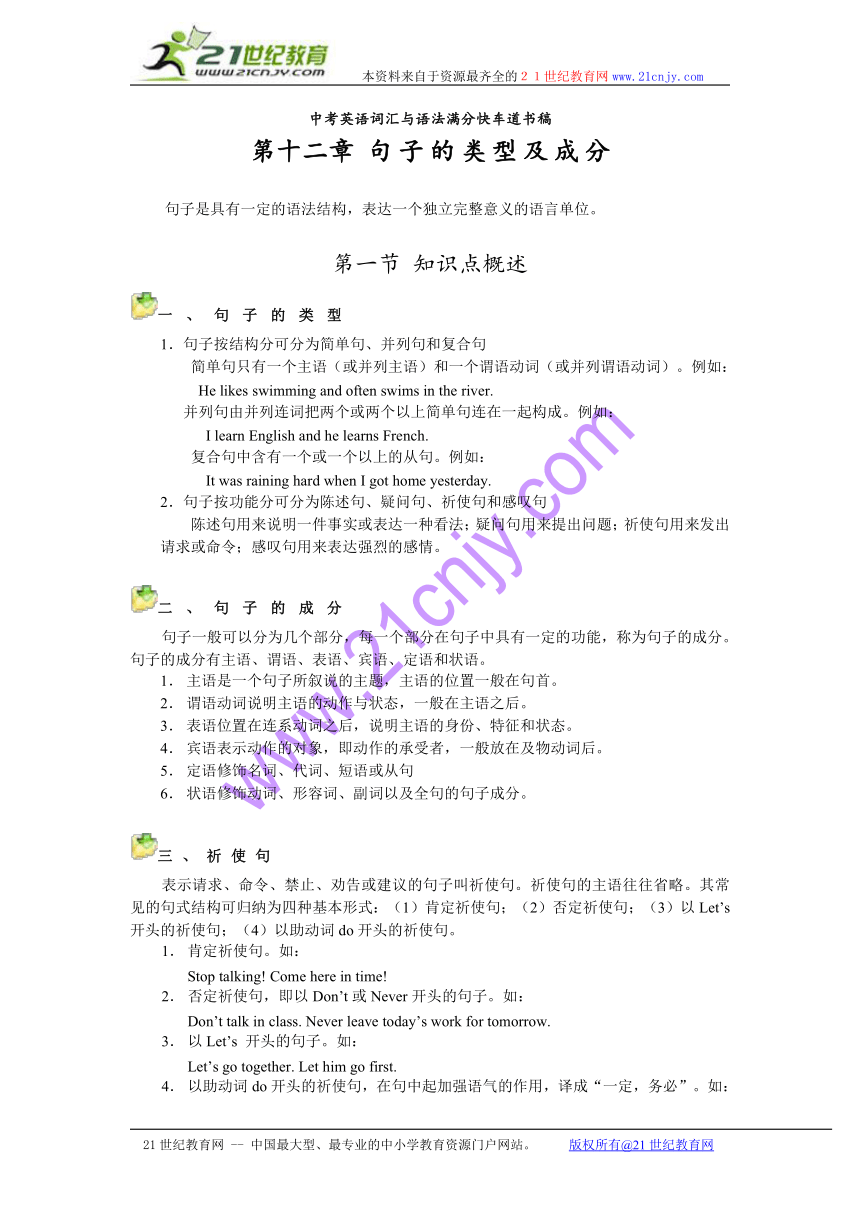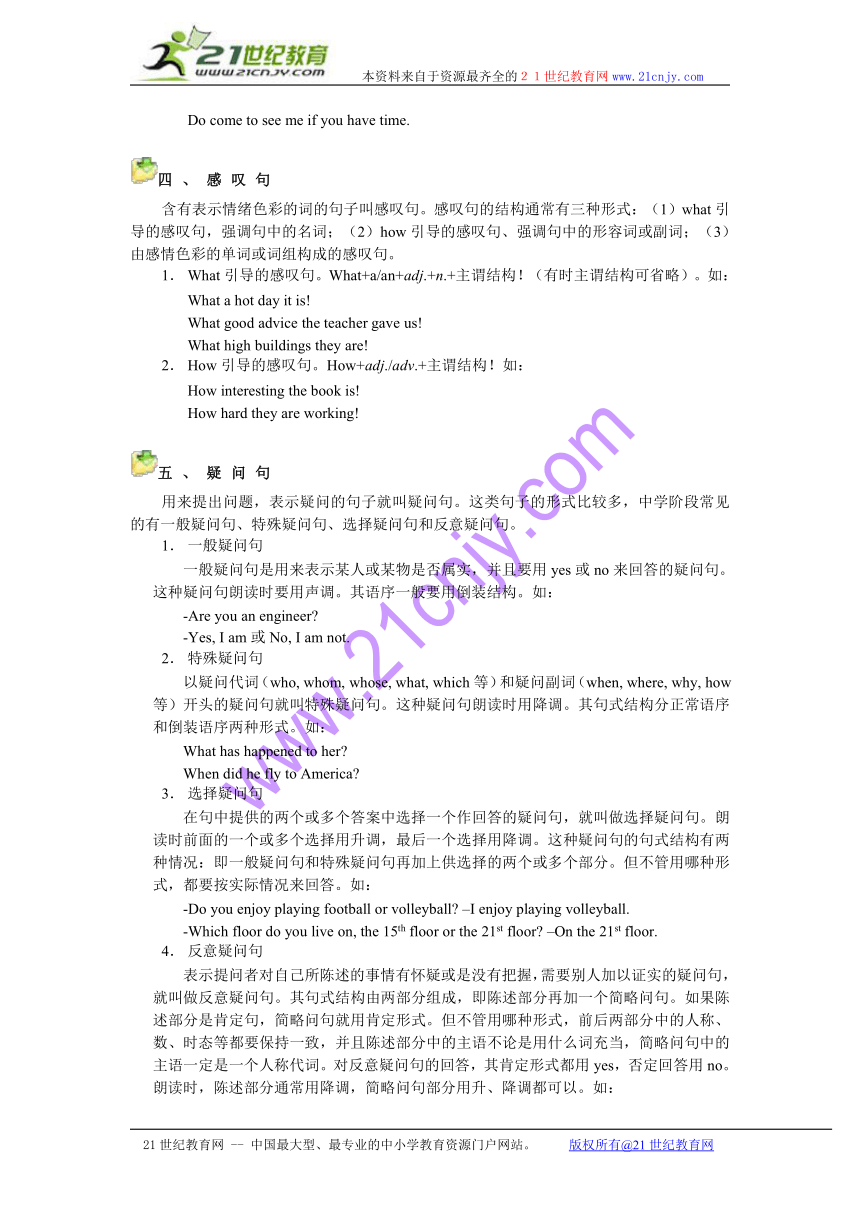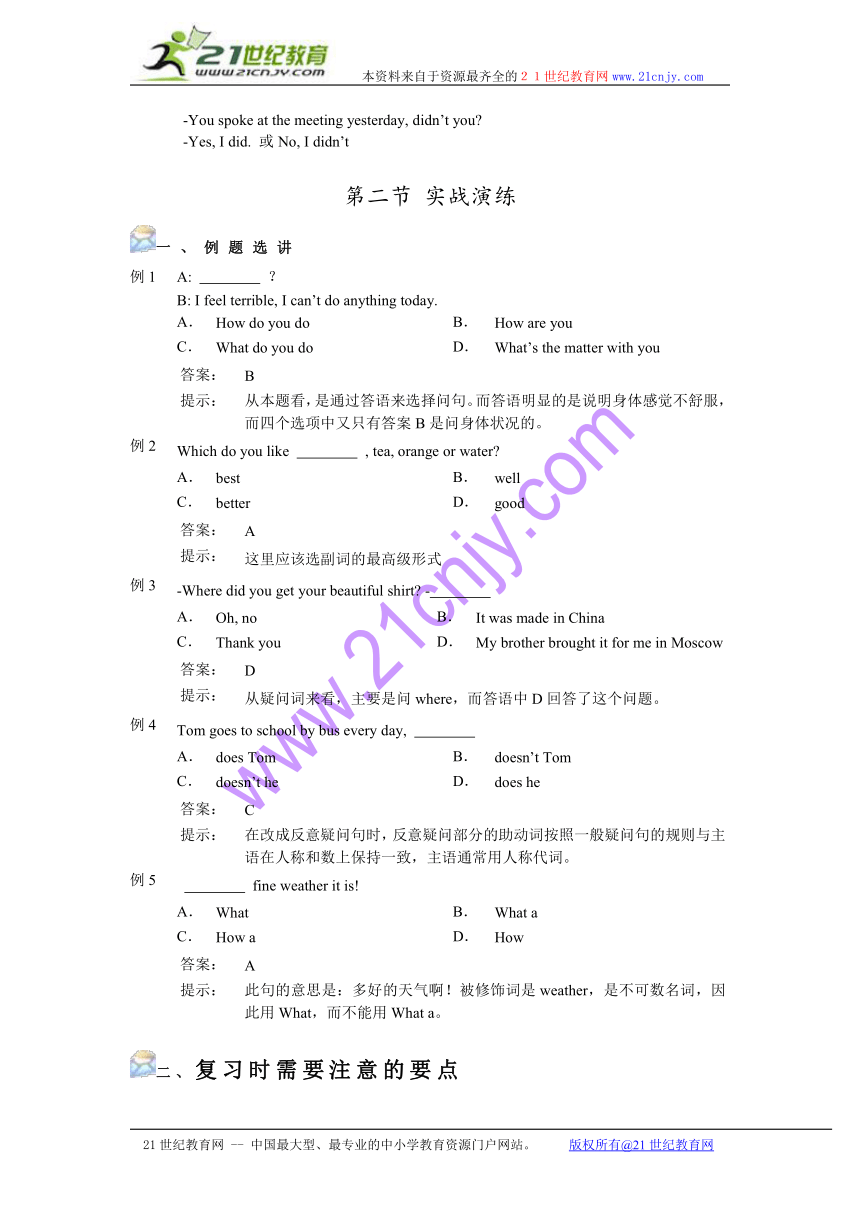中考英语词汇与语法满分快车道书稿—句子的类型及成分
文档属性
| 名称 | 中考英语词汇与语法满分快车道书稿—句子的类型及成分 |

|
|
| 格式 | rar | ||
| 文件大小 | 20.5KB | ||
| 资源类型 | 教案 | ||
| 版本资源 | 通用版 | ||
| 科目 | 英语 | ||
| 更新时间 | 2009-05-06 00:00:00 | ||
图片预览



文档简介
本资料来自于资源最齐全的21世纪教育网www.21cnjy.com
中考英语词汇与语法满分快车道书稿
第十二章 句子的类型及成分
句子是具有一定的语法结构,表达一个独立完整意义的语言单位。
第一节 知识点概述
一、句子的类型
1.句子按结构分可分为简单句、并列句和复合句
简单句只有一个主语(或并列主语)和一个谓语动词(或并列谓语动词)。例如:
He likes swimming and often swims in the river.
并列句由并列连词把两个或两个以上简单句连在一起构成。例如:
I learn English and he learns French.
复合句中含有一个或一个以上的从句。例如:
It was raining hard when I got home yesterday.
2.句子按功能分可分为陈述句、疑问句、祈使句和感叹句
陈述句用来说明一件事实或表达一种看法;疑问句用来提出问题;祈使句用来发出请求或命令;感叹句用来表达强烈的感情。
二、句子的成分
句子一般可以分为几个部分,每一个部分在句子中具有一定的功能,称为句子的成分。句子的成分有主语、谓语、表语、宾语、定语和状语。
1. 主语是一个句子所叙说的主题,主语的位置一般在句首。
2. 谓语动词说明主语的动作与状态,一般在主语之后。
3. 表语位置在连系动词之后,说明主语的身份、特征和状态。
4. 宾语表示动作的对象,即动作的承受者,一般放在及物动词后。
5. 定语修饰名词、代词、短语或从句
6. 状语修饰动词、形容词、副词以及全句的句子成分。
三、祈使句
表示请求、命令、禁止、劝告或建议的句子叫祈使句。祈使句的主语往往省略。其常见的句式结构可归纳为四种基本形式:(1)肯定祈使句;(2)否定祈使句;(3)以Let’s开头的祈使句;(4)以助动词do开头的祈使句。
1. 肯定祈使句。如:
Stop talking! Come here in time!
2. 否定祈使句,即以Don’t或Never开头的句子。如:
Don’t talk in class. Never leave today’s work for tomorrow.
3. 以Let’s 开头的句子。如:
Let’s go together. Let him go first.
4. 以助动词do开头的祈使句,在句中起加强语气的作用,译成“一定,务必”。如:
Do come to see me if you have time.
四、感叹句
含有表示情绪色彩的词的句子叫感叹句。感叹句的结构通常有三种形式:(1)what引导的感叹句,强调句中的名词;(2)how引导的感叹句、强调句中的形容词或副词;(3)由感彩的单词或词组构成的感叹句。
1. What引导的感叹句。What+a/an+adj.+n.+主谓结构!(有时主谓结构可省略)。如:
What a hot day it is!
What good advice the teacher gave us!
What high buildings they are!
2. How引导的感叹句。How+adj./adv.+主谓结构!如:
How interesting the book is!
How hard they are working!
五、疑问句
用来提出问题,表示疑问的句子就叫疑问句。这类句子的形式比较多,中学阶段常见的有一般疑问句、特殊疑问句、选择疑问句和反意疑问句。
1. 一般疑问句
一般疑问句是用来表示某人或某物是否属实,并且要用yes或no来回答的疑问句。这种疑问句朗读时要用声调。其语序一般要用倒装结构。如:
-Are you an engineer
-Yes, I am或No, I am not.
2. 特殊疑问句
以疑问代词(who, whom, whose, what, which等)和疑问副词(when, where, why, how等)开头的疑问句就叫特殊疑问句。这种疑问句朗读时用降调。其句式结构分正常语序和倒装语序两种形式。如:
What has happened to her
When did he fly to America
3. 选择疑问句
在句中提供的两个或多个答案中选择一个作回答的疑问句,就叫做选择疑问句。朗读时前面的一个或多个选择用升调,最后一个选择用降调。这种疑问句的句式结构有两种情况:即一般疑问句和特殊疑问句再加上供选择的两个或多个部分。但不管用哪种形式,都要按实际情况来回答。如:
-Do you enjoy playing football or volleyball –I enjoy playing volleyball.
-Which floor do you live on, the 15th floor or the 21st floor –On the 21st floor.
4. 反意疑问句
表示提问者对自己所陈述的事情有怀疑或是没有把握,需要别人加以证实的疑问句,就叫做反意疑问句。其句式结构由两部分组成,即陈述部分再加一个简略问句。如果陈述部分是肯定句,简略问句就用肯定形式。但不管用哪种形式,前后两部分中的人称、数、时态等都要保持一致,并且陈述部分中的主语不论是用什么词充当,简略问句中的主语一定是一个人称代词。对反意疑问句的回答,其肯定形式都用yes,否定回答用no。朗读时,陈述部分通常用降调,简略问句部分用升、降调都可以。如:
-You spoke at the meeting yesterday, didn’t you
-Yes, I did. 或No, I didn’t
第二节 实战演练
一、例题选讲
例1 A: ?B: I feel terrible, I can’t do anything today.
A. How do you do B. How are you
C. What do you do D. What’s the matter with you
答案: B
提示: 从本题看,是通过答语来选择问句。而答语明显的是说明身体感觉不舒服,而四个选项中又只有答案B是问身体状况的。
例2 Which do you like , tea, orange or water
A. best B. well
C. better D. good
答案: A
提示: 这里应该选副词的最高级形式
例3 -Where did you get your beautiful shirt -
A. Oh, no B. It was made in China
C. Thank you D. My brother brought it for me in Moscow
答案: D
提示: 从疑问词来看,主要是问where,而答语中D回答了这个问题。
例4 Tom goes to school by bus every day,
A. does Tom B. doesn’t Tom
C. doesn’t he D. does he
答案: C
提示: 在改成反意疑问句时,反意疑问部分的助动词按照一般疑问句的规则与主语在人称和数上保持一致,主语通常用人称代词。
例5 fine weather it is!
A. What B. What a
C. How a D. How
答案: A
提示: 此句的意思是:多好的天气啊!被修饰词是weather,是不可数名词,因此用What,而不能用What a。
二、复习时需要注意的要点
(1)否定词如hardly, never, neither等not+any/anything/either/ever等构成完全否定的结构。
(2)think, believe, suppose, expect, imagine等词后接宾语从句中否定结构常常移到主句的谓语动词中。
(3)反意疑问句要注意肯定部分和否定部分的搭配,两个部分动词、时态要一致。
第三节 巩固练习
I. 将下列句子改为反意疑问句。
1. They had a good time, ________ ________
2. He seldom goes to the park, ________ ________
3. Don’t throw the waste paper on the ground, ________ ________
4. He often does his homework in the evening, ________ ________
5. He thought he could do it by himself, ________ ________
6. I don’t think he has been to America, ________ ________
7. There is little water in the bottle, ________ ________
8. Don’t be late for school, ________ ________
9. Let him go first, ________ ________
10. His father had lunch at the factory, ________ ________
II. 将下列句子改为感叹句。
1. The book is very interesting.
2. He gave me some useful advice.
3. The music sounds interesting.
4. They had a good time that day.
5. The moon is bright tonight.
6. They are working hard.
7. The boy runs fast.
8. She had long hair.
9. They are working hard.
10. He brought us exciting news.
III. 对下列句子的划线部分提问。
1. At nine o’clock the rich woman asked the singer to come upstairs.
2. She decided to give art lessons to the poor girl.
3. They went out to look for the lost child.
4. It’s about 2 kilometers from my home to the nearest hospital.
5. The Yellow River is 5464 kilometers long.
6. That’s Mr Green’s house.
7. She went to the station to meet her mother last night.
8. This dictionary is six dollars.
9. It’s Friday today.
10. It’s January 3rd tomorrow.
11. He likes maths best.
12. They studied in No.11 Middle School.
IV. 指出下列句子的类型
1. They have worked hard since then.
2. When I got there, it was raining hard.
3. I looked, but saw nothing
4. He didn’t attend the meeting, because he was ill.
5. I saw him doing his homework.
6. It was easy for us to recite the text.
7. What is the name of the book that you borrowed yesterday
8. The film is interesting, so I want to see it again.
9. How to get rid of pollution is a series problem.
11. What he sad is very important.
答案
I、
1.didn’t they 2.does he 3.will you 4.doesn’t he 5.didn’t he
6.had he 7.is there 8.will you 9.will you 10.didn’t he
II、
1. How interesting the book is! / What an interesting book it is!
2. What useful advice he gave me!
3. How interesting the music sounds!
4. What a good time they had that day!
5. How bright the moon is tonight!
6. How hard they are working!
7. How fast the boy runs!
8. What long hair she had!
9. How hard they are working!
10. What exciting news he brought us!
III、
1. What time did the rich woman ask the singer to come upstairs
2. Who did she decide to give art lessons to
3. Why did they go out
4. How far is it from my home to the nearest hospital
5. How long is the Yellow River
6. Whose house is that
7. Where did she go to meet her mother last night
8. How much is this dictionary
9. What day is it today
10. What’s the date tomorrow
11. Which subject dies he like best
12. Which middle school did they study in
IV、
1. 简单句
2. 复合句
3. 并列句
4. 复合句
5. 简单句
6. 简单句
7. 复合句
8. 并列句
9. 简单句
10. 复合句
21世纪教育网 -- 中国最大型、最专业的中小学教育资源门户网站。 版权所有@21世纪教育网
中考英语词汇与语法满分快车道书稿
第十二章 句子的类型及成分
句子是具有一定的语法结构,表达一个独立完整意义的语言单位。
第一节 知识点概述
一、句子的类型
1.句子按结构分可分为简单句、并列句和复合句
简单句只有一个主语(或并列主语)和一个谓语动词(或并列谓语动词)。例如:
He likes swimming and often swims in the river.
并列句由并列连词把两个或两个以上简单句连在一起构成。例如:
I learn English and he learns French.
复合句中含有一个或一个以上的从句。例如:
It was raining hard when I got home yesterday.
2.句子按功能分可分为陈述句、疑问句、祈使句和感叹句
陈述句用来说明一件事实或表达一种看法;疑问句用来提出问题;祈使句用来发出请求或命令;感叹句用来表达强烈的感情。
二、句子的成分
句子一般可以分为几个部分,每一个部分在句子中具有一定的功能,称为句子的成分。句子的成分有主语、谓语、表语、宾语、定语和状语。
1. 主语是一个句子所叙说的主题,主语的位置一般在句首。
2. 谓语动词说明主语的动作与状态,一般在主语之后。
3. 表语位置在连系动词之后,说明主语的身份、特征和状态。
4. 宾语表示动作的对象,即动作的承受者,一般放在及物动词后。
5. 定语修饰名词、代词、短语或从句
6. 状语修饰动词、形容词、副词以及全句的句子成分。
三、祈使句
表示请求、命令、禁止、劝告或建议的句子叫祈使句。祈使句的主语往往省略。其常见的句式结构可归纳为四种基本形式:(1)肯定祈使句;(2)否定祈使句;(3)以Let’s开头的祈使句;(4)以助动词do开头的祈使句。
1. 肯定祈使句。如:
Stop talking! Come here in time!
2. 否定祈使句,即以Don’t或Never开头的句子。如:
Don’t talk in class. Never leave today’s work for tomorrow.
3. 以Let’s 开头的句子。如:
Let’s go together. Let him go first.
4. 以助动词do开头的祈使句,在句中起加强语气的作用,译成“一定,务必”。如:
Do come to see me if you have time.
四、感叹句
含有表示情绪色彩的词的句子叫感叹句。感叹句的结构通常有三种形式:(1)what引导的感叹句,强调句中的名词;(2)how引导的感叹句、强调句中的形容词或副词;(3)由感彩的单词或词组构成的感叹句。
1. What引导的感叹句。What+a/an+adj.+n.+主谓结构!(有时主谓结构可省略)。如:
What a hot day it is!
What good advice the teacher gave us!
What high buildings they are!
2. How引导的感叹句。How+adj./adv.+主谓结构!如:
How interesting the book is!
How hard they are working!
五、疑问句
用来提出问题,表示疑问的句子就叫疑问句。这类句子的形式比较多,中学阶段常见的有一般疑问句、特殊疑问句、选择疑问句和反意疑问句。
1. 一般疑问句
一般疑问句是用来表示某人或某物是否属实,并且要用yes或no来回答的疑问句。这种疑问句朗读时要用声调。其语序一般要用倒装结构。如:
-Are you an engineer
-Yes, I am或No, I am not.
2. 特殊疑问句
以疑问代词(who, whom, whose, what, which等)和疑问副词(when, where, why, how等)开头的疑问句就叫特殊疑问句。这种疑问句朗读时用降调。其句式结构分正常语序和倒装语序两种形式。如:
What has happened to her
When did he fly to America
3. 选择疑问句
在句中提供的两个或多个答案中选择一个作回答的疑问句,就叫做选择疑问句。朗读时前面的一个或多个选择用升调,最后一个选择用降调。这种疑问句的句式结构有两种情况:即一般疑问句和特殊疑问句再加上供选择的两个或多个部分。但不管用哪种形式,都要按实际情况来回答。如:
-Do you enjoy playing football or volleyball –I enjoy playing volleyball.
-Which floor do you live on, the 15th floor or the 21st floor –On the 21st floor.
4. 反意疑问句
表示提问者对自己所陈述的事情有怀疑或是没有把握,需要别人加以证实的疑问句,就叫做反意疑问句。其句式结构由两部分组成,即陈述部分再加一个简略问句。如果陈述部分是肯定句,简略问句就用肯定形式。但不管用哪种形式,前后两部分中的人称、数、时态等都要保持一致,并且陈述部分中的主语不论是用什么词充当,简略问句中的主语一定是一个人称代词。对反意疑问句的回答,其肯定形式都用yes,否定回答用no。朗读时,陈述部分通常用降调,简略问句部分用升、降调都可以。如:
-You spoke at the meeting yesterday, didn’t you
-Yes, I did. 或No, I didn’t
第二节 实战演练
一、例题选讲
例1 A: ?B: I feel terrible, I can’t do anything today.
A. How do you do B. How are you
C. What do you do D. What’s the matter with you
答案: B
提示: 从本题看,是通过答语来选择问句。而答语明显的是说明身体感觉不舒服,而四个选项中又只有答案B是问身体状况的。
例2 Which do you like , tea, orange or water
A. best B. well
C. better D. good
答案: A
提示: 这里应该选副词的最高级形式
例3 -Where did you get your beautiful shirt -
A. Oh, no B. It was made in China
C. Thank you D. My brother brought it for me in Moscow
答案: D
提示: 从疑问词来看,主要是问where,而答语中D回答了这个问题。
例4 Tom goes to school by bus every day,
A. does Tom B. doesn’t Tom
C. doesn’t he D. does he
答案: C
提示: 在改成反意疑问句时,反意疑问部分的助动词按照一般疑问句的规则与主语在人称和数上保持一致,主语通常用人称代词。
例5 fine weather it is!
A. What B. What a
C. How a D. How
答案: A
提示: 此句的意思是:多好的天气啊!被修饰词是weather,是不可数名词,因此用What,而不能用What a。
二、复习时需要注意的要点
(1)否定词如hardly, never, neither等not+any/anything/either/ever等构成完全否定的结构。
(2)think, believe, suppose, expect, imagine等词后接宾语从句中否定结构常常移到主句的谓语动词中。
(3)反意疑问句要注意肯定部分和否定部分的搭配,两个部分动词、时态要一致。
第三节 巩固练习
I. 将下列句子改为反意疑问句。
1. They had a good time, ________ ________
2. He seldom goes to the park, ________ ________
3. Don’t throw the waste paper on the ground, ________ ________
4. He often does his homework in the evening, ________ ________
5. He thought he could do it by himself, ________ ________
6. I don’t think he has been to America, ________ ________
7. There is little water in the bottle, ________ ________
8. Don’t be late for school, ________ ________
9. Let him go first, ________ ________
10. His father had lunch at the factory, ________ ________
II. 将下列句子改为感叹句。
1. The book is very interesting.
2. He gave me some useful advice.
3. The music sounds interesting.
4. They had a good time that day.
5. The moon is bright tonight.
6. They are working hard.
7. The boy runs fast.
8. She had long hair.
9. They are working hard.
10. He brought us exciting news.
III. 对下列句子的划线部分提问。
1. At nine o’clock the rich woman asked the singer to come upstairs.
2. She decided to give art lessons to the poor girl.
3. They went out to look for the lost child.
4. It’s about 2 kilometers from my home to the nearest hospital.
5. The Yellow River is 5464 kilometers long.
6. That’s Mr Green’s house.
7. She went to the station to meet her mother last night.
8. This dictionary is six dollars.
9. It’s Friday today.
10. It’s January 3rd tomorrow.
11. He likes maths best.
12. They studied in No.11 Middle School.
IV. 指出下列句子的类型
1. They have worked hard since then.
2. When I got there, it was raining hard.
3. I looked, but saw nothing
4. He didn’t attend the meeting, because he was ill.
5. I saw him doing his homework.
6. It was easy for us to recite the text.
7. What is the name of the book that you borrowed yesterday
8. The film is interesting, so I want to see it again.
9. How to get rid of pollution is a series problem.
11. What he sad is very important.
答案
I、
1.didn’t they 2.does he 3.will you 4.doesn’t he 5.didn’t he
6.had he 7.is there 8.will you 9.will you 10.didn’t he
II、
1. How interesting the book is! / What an interesting book it is!
2. What useful advice he gave me!
3. How interesting the music sounds!
4. What a good time they had that day!
5. How bright the moon is tonight!
6. How hard they are working!
7. How fast the boy runs!
8. What long hair she had!
9. How hard they are working!
10. What exciting news he brought us!
III、
1. What time did the rich woman ask the singer to come upstairs
2. Who did she decide to give art lessons to
3. Why did they go out
4. How far is it from my home to the nearest hospital
5. How long is the Yellow River
6. Whose house is that
7. Where did she go to meet her mother last night
8. How much is this dictionary
9. What day is it today
10. What’s the date tomorrow
11. Which subject dies he like best
12. Which middle school did they study in
IV、
1. 简单句
2. 复合句
3. 并列句
4. 复合句
5. 简单句
6. 简单句
7. 复合句
8. 并列句
9. 简单句
10. 复合句
21世纪教育网 -- 中国最大型、最专业的中小学教育资源门户网站。 版权所有@21世纪教育网
同课章节目录
